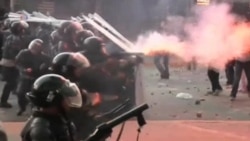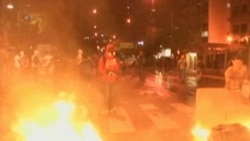WASHINGTON —
Nearly one year after the death of Venezuelan President Hugo Chavez, violent protests have erupted against his hand-picked successor, President Nicolas Maduro. The unrest is fed by deteriorating economic conditions and rampant lawlessness that cast fresh doubts on the viability of the socialist experiment Chavez launched in Venezuela more than 15 years ago.
Growing numbers of Venezuelans are taking to the streets and confronting riot police.
One protester said, “We Venezuelans do not have food. There are no jobs, no education. There is insecurity. We don't want this anymore."
WATCH: Related video from VOA
The unrest comes as no surprise to Latin America expert Michael Shifter. “Economic conditions have never been worse in Venezuela. Crime is off the charts, completely uncontrolled. Inflation is the highest in the world, there are shortages of basic goods. And there is widespread frustration and discontent with the government,” he said.
Maduro mobilizes supporters
Maduro has mobilized his backers, including petroleum workers like Jose Hernandez. “The oil industry stands with President Maduro, with his economic measures, in order to counter everything the oligarchy is doing.”
The “oligarchy” is a reference to Venezuela’s political opposition, whose leader, Leopoldo Lopez, has been arrested.
“We have to take up protests in the streets. It is a moral duty, a patriotic duty. If not now, then when?” asked Lopez.
Lopez stands accused of inciting violence. Maduro also accuses the United States of engineering unrest, and has expelled three American diplomats. White House spokesman Jay Carney refutes the charge.
“We have seen many times that the Venezuelan government tries to distract from its own actions by blaming the U.S. or other members of the international community for events inside Venezuela," said Carney.
Deteriorating situation
Meanwhile, Maduro is making thinly-veiled threats about any effort to remove him from office.
“If one day you receive news that the oligarchy succeeded in toppling a government, a scenario that will not happen, then perhaps this peaceful, democratic revolution will take on another character, an armed one, deeply revolutionary. The world should know this. We are willing to do everything necessary,” said Maduro.
In his quest to boost the fortunes of Venezuela’s poor, former President Chavez concentrated political power and depleted Venezuela’s substantial oil revenues for massive social welfare programs. He is proving a tough act to follow, according to analyst Michael Shifter.
“Chavez really had the charisma. He had tremendous political skills, and he had money. He rode a boom in Venezuela. And his successor does not have charisma, does not have political skills, and is really strapped on the fiscal front,” said Shifter.
Shifter does not believe a coup is likely, but thinks conditions in Venezuela could deteriorate further, leading to far deeper, more widespread unrest and pressure for new elections on an accelerated timeline.
Growing numbers of Venezuelans are taking to the streets and confronting riot police.
One protester said, “We Venezuelans do not have food. There are no jobs, no education. There is insecurity. We don't want this anymore."
WATCH: Related video from VOA
The unrest comes as no surprise to Latin America expert Michael Shifter. “Economic conditions have never been worse in Venezuela. Crime is off the charts, completely uncontrolled. Inflation is the highest in the world, there are shortages of basic goods. And there is widespread frustration and discontent with the government,” he said.
Maduro mobilizes supporters
Maduro has mobilized his backers, including petroleum workers like Jose Hernandez. “The oil industry stands with President Maduro, with his economic measures, in order to counter everything the oligarchy is doing.”
The “oligarchy” is a reference to Venezuela’s political opposition, whose leader, Leopoldo Lopez, has been arrested.
“We have to take up protests in the streets. It is a moral duty, a patriotic duty. If not now, then when?” asked Lopez.
Lopez stands accused of inciting violence. Maduro also accuses the United States of engineering unrest, and has expelled three American diplomats. White House spokesman Jay Carney refutes the charge.
“We have seen many times that the Venezuelan government tries to distract from its own actions by blaming the U.S. or other members of the international community for events inside Venezuela," said Carney.
Deteriorating situation
Meanwhile, Maduro is making thinly-veiled threats about any effort to remove him from office.
“If one day you receive news that the oligarchy succeeded in toppling a government, a scenario that will not happen, then perhaps this peaceful, democratic revolution will take on another character, an armed one, deeply revolutionary. The world should know this. We are willing to do everything necessary,” said Maduro.
In his quest to boost the fortunes of Venezuela’s poor, former President Chavez concentrated political power and depleted Venezuela’s substantial oil revenues for massive social welfare programs. He is proving a tough act to follow, according to analyst Michael Shifter.
“Chavez really had the charisma. He had tremendous political skills, and he had money. He rode a boom in Venezuela. And his successor does not have charisma, does not have political skills, and is really strapped on the fiscal front,” said Shifter.
Shifter does not believe a coup is likely, but thinks conditions in Venezuela could deteriorate further, leading to far deeper, more widespread unrest and pressure for new elections on an accelerated timeline.






